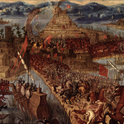Two whole territories of English literature have been sunk by the rising tides of uneducation. One is the literature of England in Latin-few now read, say, Milton and Marvell in what was Europe's common tongue for 1,500 years-and the other is the essay. Of the two, loss of the latter is far the most regrettable, for English is incomparably rich in the art of the essay, to which a significant portion of its greatest literature belongs.
The following paragraphs name 20 of the art's best exponents, and the cited essays exemplify their best. Good secondhand bookshops abound in collections and anthologies; the pleasures of searching for them heighten those of discovery.
The example of Montaigne, father of the essay, was quickly followed in England by Francis Bacon (1561-1626) and Abraham Cowley (1618-67). Bacon's essays are the product of acute observation; his Of Studies contains the much-quoted "reading maketh a full man, conference a ready man, and writing an exact man." Cowley was once more famous than his contemporary Milton. In Of My Self he relates his childhood joy in reading Spenser, and the blighting of his youth by the civil war.
An outstanding triumvir inaugurated the 18th century: Joseph Addison (1672-1719), Jonathan Swift (1667-1745) and Richard Steele (1672-1729). For the supple purity of Addison's prose see Meditations in Westminster Abbey, and for the comic pungency of Swift's satire see A Meditation upon a Broomstick. Steele's autobiographical method, exemplified in his graphic A Prize Fight, is far ahead of its time. The century's achievements also include David Hume's intellectual acuity (1711-76) and Samuel Johnson's Latin monumentality (1709-84), as demonstrated by the former's The Stoic, which proves the superiority of the philosophical to the sybaritic life, and the latter's elephantinely but bitterly humorous On the Advantages of Living in a Garret.
The supreme English essayist is William Hazlitt (1778-1830). Not only a wondrous writer, but a fiercely independent thinker, he is the star of the great age of periodical reviews. Modern criticism of art, drama and literature have some of their roots in him, as do political polemic and psychological autobiography. My First Acquaintance with Poets, recording his early meetings with Coleridge and Wordsworth, is one of many masterpieces. Honouring his debt long after the two had quarrelled, Hazlitt wrote that before Coleridge he was dumb, but as a result of his inspiration "my ideas float on winged words, and as they expand their plumes, they catch the light of other years."
For some, Charles Lamb (1775-1834) vies with Hazlitt for the essayist's crown. Whimsical, unworldly, his work is irresistibly charming and exquisitely wrought. For an introduction to the delights of the essay in general nothing can outdo his hilarious Dissertation upon Roast Pig, from which it is impossible to quote less than the whole.
Leigh Hunt (1784-1859) and Thomas de Quincey (1785-1859) unfairly suffer in the shadow of these Olympians. Hunt is a craftsman, as his World of Books shows, with its exact remark about the westerner's miniaturist conception of the Chinese as "people with little names, little eyes, and little feet, who sit in little bowers, drinking little cups of tea, and writing little odes." De Quincey's ability to elaborate the fascinating and forgotten is well displayed in On Murder, Considered as one of the Fine Arts.
Leslie Stephen (1832-1904), father of Virginia Woolf is an intellectual historian and essayist of the first rank. Both talents shine in Cowper and Rousseau, in which he dissects the "return to nature" reaction of Romanticism to the Enlightenment.
Matthew Arnold (1822-88) flayed his age in Culture and Anarchy, coining the pejorative "Philistinism" in the process. Some of his arguments are even more relevant today. Robert Louis Stevenson's (1850-94) essays contain his best writing. He smiths his words beautifully, but on casual themes; still, every maiden and youth should read Virginibus Puerisque long before contemplating marriage or its modern variants.
George Saintsbury (1845-1933), least polished stylist of these named, is among the most perceptive, as his Carlyle proves. Augustine Bir-rell (1850-1933), like Stevenson more entertainer than thinker, is standardly enjoyable, as in The Defamation of Genius. Hilaire Belloc (1870-1953), despite his Fascism, is the most various and unexpected of writers, as On Rasselas shows. Lytton Strachey (1880-1932) is perennially delicious: in The End of General Gordon he describes how the eponymous hero "passed through every danger with the scatheless equanimity of a demigod."
George Orwell (1903-1950) is one of the few essayists to need no introduction; Inside the Whale is probably the best. Neville Cardus (1889-1975) continued the tradition into the postwar period, as Cricket Fields and Cricketers shows.
There are still essayists; but the exigencies of their trades, whether in journalism or academy, mostly oblige them away from the essay to write "pieces," "papers" and "articles" instead. The difference, though subtle, is definite.












